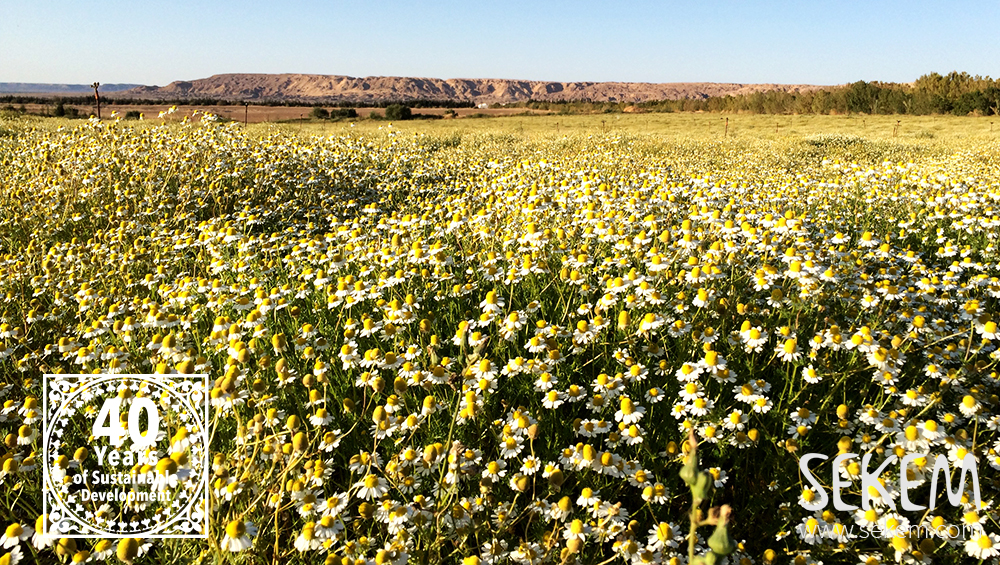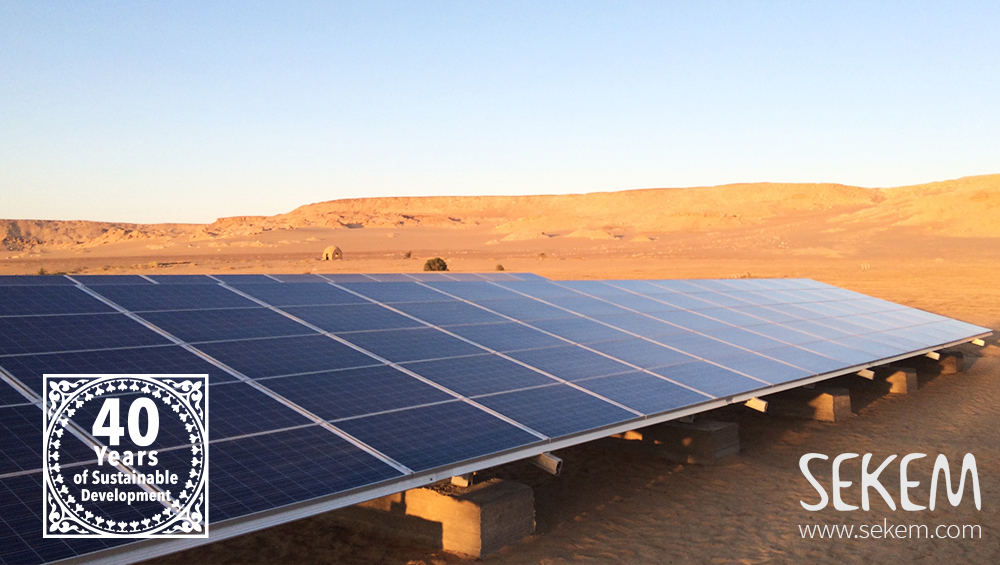The SEKEM Initiative celebrates its 40th anniversary this year as well as decades of stories with friends and partners which go back a long way. “Today, much more than a purely formal relationship connects us with our long-term financial partners. There are grown stories, friendships, relationships – to my father, of course, to me and many others in SEKEM“, reports Helmy Abouleish, SEKEMs CEO.
1981: The first credit
The first credit which benefited SEKEM was granted by the GLS bank in 1981 – namely to a German agricultural association. The SEKEM supporters, Frieda Gögler and Elfriede Werner, then thereby co-financed the purchase of 40 brown cattle and their transport from the Allgäu region in Germany to SEKEM. GLS stands for “Gemeinschaftsbank für Leihen und Schenken”, which translates as “community bank for loans and gifts”. Since then, the community bank has been supporting many of SEKEMs social and cultural activities – the SEKEM school and the SEKEM Friends Associations, for example.
Gerhard Waterstradt, former GLS board member, usually played a part in this. When the longtime SEKEM friend handed over his former function to today’s GLS board spokesman Thomas Jorberg, they both visited SEKEM and Egypt together for the first time in November 2005.

A journey that changed everything
Together with Helmy Abouleish, they traveled to the Al-Bahariyya oasis in Egypt’s Western Desert, where SEKEM had acquired new land. “Endless desert, about 800 to 900 hectares – without a bush or even a tree. Helmy drove us around this strip of land for miles, showing us four red flags, almost spilled from the sand”, remembers Gerhard Waterstradt today. “There, the entrepreneur spirit and the imagination arose in us, what could get developed on the terrain in the next five to ten years. In the evening, we asked ourselves whether the friendly European alternative banks such as Triodos Bank could support SEKEMs future development”, he continues.
After many further talks in Germany, the Netherlands and Egypt, as well as after obtaining many permits and signatures, GLS and Triodos Bank have been SEKEM partners and shareholders since 2007. Both support SEKEM in all economic development issues, but also in agricultural development, for instance.
Mutual taking and giving
For the Triodos Bank, it was a very conscious decision to support SEKEM as a shareholder: “We like how SEKEM deals with the question of becoming a living community and really tries to bring in sustainable principles at all levels – like with the Heliopolis University, with the organic products and the vocational training for young people, for example”, explains Peter Blom, CEO of Triodos Bank. “All this makes SEKEM pretty unique. We do to not only want to support this unique initiative, but also learn from it”, he continues.

Being there for each other – even in critical times
In a further phase of the capital increase, SEKEM became an Oikocredit partner. “2011 was the year of the revolution – a year in which everyone else refrained from investments in Egypt”, explains Helmy Abouleish. Despite challenging circumstances, Stefan Harpe, then manager of equity investments for Oikocredit, continued to believe in SEKEM and convinced the board to support an investment. The funds were deployed in 2012. “This helped SEKEM to overcome a difficult time and was an important symbol for us. We appreciate that Oikocredit had the courage to invest in Egypt despite the challenging backdrop”, says Helmy Abouleish. Oikocredit, a large global social investor, converted its loan into capital and became an important equity investor in SEKEM in 2015. Tom Keleher, Equity Deputy Director of Oikocredit added more recently that, “Oikocredit is very proud to be a committed active investor in SEKEM.”
Being loyal for more than 30 years
In turn, the German Entrepreneurial Development Cooperation (DEG) was the first financial company to invest in the economic development of SEKEM. “DEG has been granting loans to us since 1985 – for more than 30 years. This means that the DEG is the partner with whom we have longest commercial cooperation”, says Helmy Abouleish. When SEKEM signed the first contract with DEG in 1985, DEG was not only a lender, but also a shareholder of the company that is ATOS Pharma today. Over the past 30 years, DEG and SEKEM have realized a lot together: “I always thought that SEKEM is the ideal partner for DEG because SEKEM is exactly what DEG wants to promote – namely shaping sustainable development for both the people and the environment in a difficult environment and in an excellent way”, knows Jörg Laschet, Senior Credit Analyst at DEG.
“If the focus is on people’s development, money must have a different role than being piled up with individuals.”
Shared values
The common understanding that money is not a product and that it is not about profit maximization, but about the sensible use of money, is the basis for the successful cooperation between all four partners. “I believe that this is the future of money and banking. If the focus is on people’s development, money must have a different role than being piled up with individuals”, says Helmy Abouleish. “Together with our partners, we are taking a path where there are setbacks, successes, problems and challenges. And all this is welcome, because it is about development and not about profit. And a challenge is often much more helpful than success”, he further says.
Since SEKEM focuses on the development of people, the SEKEM initiative intends to further deepen its cooperation – but is open for winning new, like-minded partners at the same time. Likewise, the Heliopolis University for Sustainable Development, which was established by the SEKEM initiative and opened in 2012, wants to expand its activities in the future. Since 2016, the university has covered its own costs, has over 1000 enrolled students and already adopted first graduates last year. In the future, the Heliopolis University intends to set up three more faculties for sustainable agriculture, dentistry and physiotherapy as well as to initiate the project “House of Cultures”. The latter means to establish a meeting place for the Arab and European world, in which students, teachers and employees can exchange each other, as well as various art and cultural events take place. In order to establish the university as an independent institution in the long term, the university seeks partners who contribute with equity, donations and patient loans. “We hope and are confident that we will find like-minded partners for this project as well”, adds SEKEMs Managing Director.
Christina Büns
SEKEMs Friends, Partners and Networks
SEKEM is Committed to all Sustainability Goals of the United Nations

